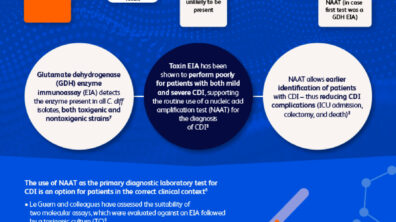
Gastrointestinal infection (GI) - May 01, 2015
Time-motion analysis: stool culture vs BD MAX™ Enteric Bacterial panel
Comparison of time-motion analysis of conventional stool culture and the BD MAX™ Enteric Bacterial Panel (EBP)
Joel E Mortensen 1, Cindi Ventrola 1, Sarah Hanna 1, Adam Walter 2
May 2015
Abstract
Background: Conventional bacterial stool culture is one of the more time-consuming tests in a routine clinical microbiology laboratory. In addition, less than 5 % of stool cultures yield positive results. A molecular platform, the BD MAX™ System (BD Diagnostics, Sparks, MD) offers the potential for significantly more rapid results and less hands-on time. Time-motion analysis of the BD MAX™ Enteric Bacterial Panel (EBP) (BD Diagnostics, Quebec, Canada) on the BD MAX™ System was compared to conventional stool culture in the microbiology laboratory of a tertiary care pediatric hospital.
Methods: The process impact analysis of time-motion studies of conventional cultures were compared to those of EBP with 86 stool specimens. Sample flow, hands-on time, processing steps, and overall turnaround time were determined and analyzed. Data were obtained and analyzed from both standard operating procedures and direct observation. A regression analysis was performed to ensure consistency of measurements. Time and process measurements started when the specimens were logged into the accessioning area of the microbiology laboratory and were completed when actionable results were generated.
Results: With conventional culture, negative culture results were available from 41:14:27 (hours:minutes:seconds) to 54:17:19; with EBP, positive and negative results were available from 2:28:40 to 3:33:39.
Conclusions: This study supports the suggestion that use of the EBP to detect commonly encountered stool pathogens can result in significant time savings and a shorter time-to-result for patients with acute bacterial diarrhea.













